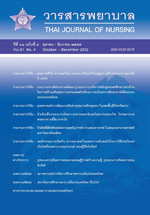กระบวนการมีส่วนร่วมพัฒนารูปแบบการบริหารหลักสูตร เพศศึกษารอบด้าน ในการสร้างเสริมสุขภาวะทางเพศสำหรับเยาวชน ในสถานศึกษาภาคใต้ตอนบนของประเทศไทย
Main Article Content
Abstract
การวิจัยเชิงปฏิบัติการแบบมีส่วนร่วมนี้มุ่งศึกษา กระบวนการมีส่วนร่วมพัฒนารูปแบบการบริหารหลักสูตร เพศศึกษารอบด้านในการสร้างเสริมสุขภาวะทางเพศสำหรับ เยาวชนในสถานศึกษา และประเมินประสิทธิผลของ รูปแบบฯ กลุ่มตัวอย่างถูกเลือกแบบเจาะจงจากโรงเรียน ขยายโอกาสและโรงเรียนมัธยมศึกษาที่เข้าร่วมโครงการ ส่งเสริมเพศศึกษารอบด้านสำหรับเยาวชนในสถานศึกษาใน เขตพื้นที่ 4 จังหวัดภาคใต้ตอนบน จำนวน 58 โรงเรียน กระบวนการพัฒนารูปแบบฯ มี 4 ระยะ ใช้เวลาศึกษา 3 ปี รวบรวมข้อมูลโดยการใช้แบบสอบถาม แบบสัมภาษณ์กึ่ง โครงสร้าง การสนทนากลุ่ม การสังเกต การจัดการเรียนรู้เชิงพื้นที่ และการจัดเวทีแลกเปลี่ยนเรียนรู้ วิเคราะห์ข้อมูล โดยหาค่าความถี่ ร้อยละ ค่าเฉลี่ย ส่วนเบี่ยงเบนมาตรฐาน และการวิเคราะห์เนื้อหา
ผลการศึกษา พบว่า กระบวนการมีส่วนร่วมพัฒนา รูปแบบฯ ประกอบด้วย 4 ระยะได้แก่ ระยะที่ 1 การเตรียม ความพร้อม ต้องเริ่มจากการค้นหาผู้บริหารสถานศึกษา ตัวจริงและสร้างความเข้าใจแนวคิดเพศศึกษารอบด้าน ระยะที่ 2 ความรับผิดชอบของครู ครูต้องการพัฒนาสมรรถนะ และความปลอดภัยในการนำหลักสูตรเพศศึกษารอบด้านไปใช้ ระยะที่ 3 การนำหลักสูตรไปใช้ ความสำเร็จของการนำ หลักสูตรเพศศึกษารอบด้านไปใช้เกิดขึ้นเมื่อ 1) ผู้เกี่ยวข้องมีความเข้าใจเพศศึกษารอบด้าน 2) ผู้บริหารผลักดัน การจัดการเรียนรู้เพศศึกษารอบด้าน 3) ครูจัดการเรียนรู้ได้ ครอบคลุมทั้งเชิงปริมาณและเชิงคุณภาพ และ ระยะที่ 4 การติดตามผล ต้องการให้มีการติดตามอย่างต่อเนื่อง ภายหลังการนำรูปแบบฯ ไปใช้ เยาวชนมีพฤติกรรมเสี่ยง ทางเพศลดลง ผู้ทำงานเกี่ยวข้องมีทัศนคติและพฤติกรรม การทำงานเยาวชนเชิงบวกเพิ่มขึ้น
The participation process in developing comprehensive sex education curriculum management model on enhancing the sexuality for the youth in schools, Upper Southern of Thailand.
Aekwarangkoon, S., & Noonill, N.
The objective of this participatory action research were to study the participation process in developing comprehensive sex education curriculum management model on enhancing the sexuality for the youth in schools and to evaluate the model utilization. The study groups were purposively selected from the students in the extension schools and secondary schools that had participated in the project of comprehensive sex education enhancing the sexuality for the youth in 58 schools of Upper Southern Provinces. The process of model development included four stages within 3 years. The data were collected by using the questionnaire, semi-structural interview, dialogue in group, area learning management observation and learning exchange. The data were analyzed for frequency, percentage, mean, standard deviation, and content analysis.
The four stages of participation process in model development were as follows. Stage 1. Preparation stage; this stage needed for searching the actual school director and clarifying the concept of comprehensive sex education. Stage 2. Teacher responsibility stage; the teachers needed for competency training and safety in the comprehensive sex education implementation. Stage 3. Curriculum implementation stage; the success could occur according to the followings. 1) People who involved in the process had clear understanding on the comprehensive sex education. 2) The school director supported proactively in the management of sex education learning. 3) The teachers could manage student learning effectively for both quantity and quality outcomes. Stage 4. The follow- up stage; this stage needed to be done continuously. After the implementation of this model, the youths' sexual risk behavior had decreased, and the working personnel had increased in their positive attitude and working behavior toward the youth.


